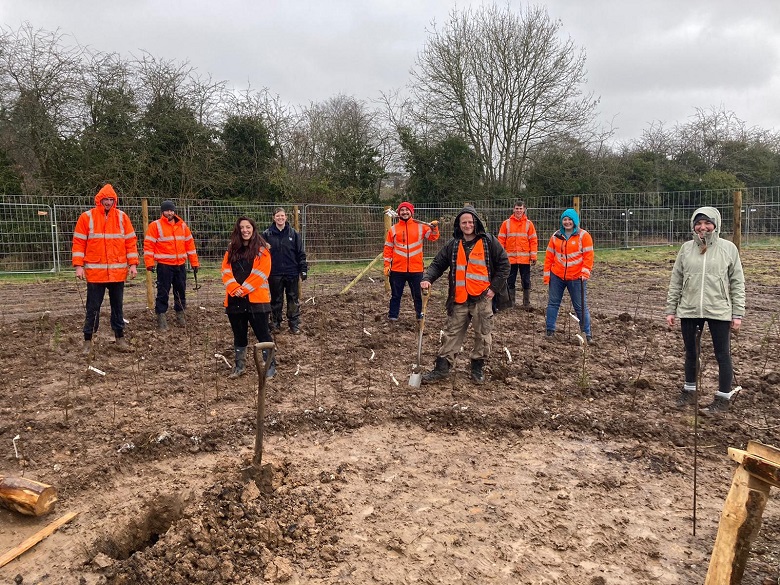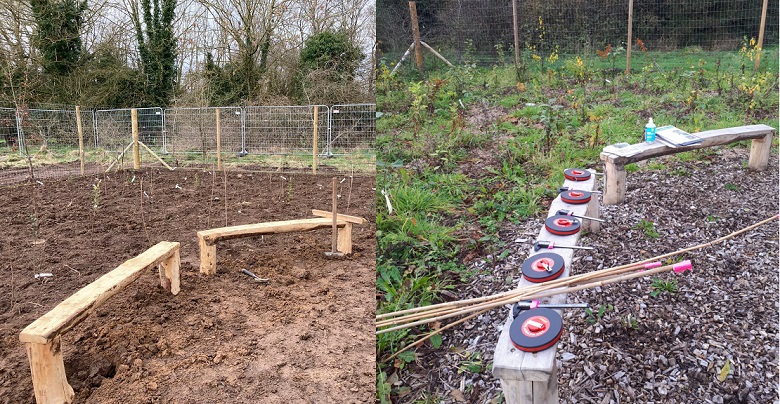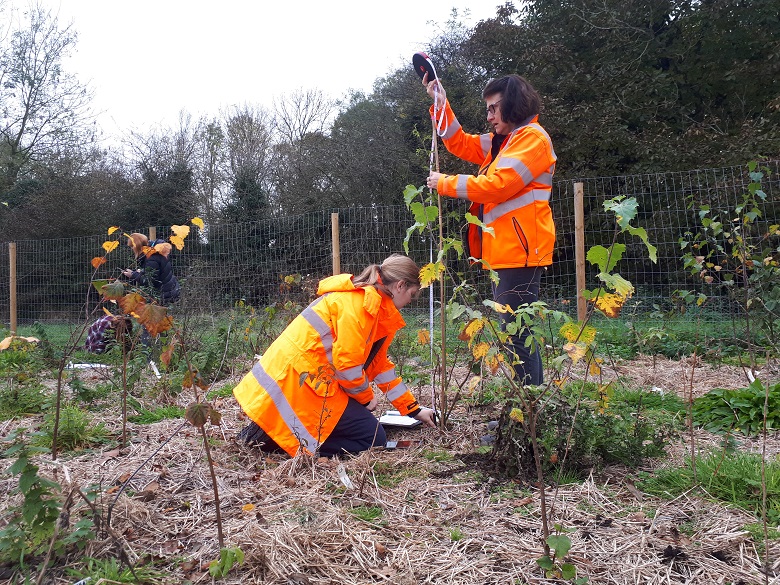Berkshire’s first ‘Miyawaki’ Tiny Forests trial innovative tree planting methods
Wednesday 1st December 2021 13:19

Thames Water volunteers, Earthwatch Europe and Newbury Wildlife and Environment Team planting the Tiny Forests in March 2021

Tree growth between planting in March 2021 and monitoring in November 2021
- 1,200 trees planted at Thames Water's Speen water treatment works in Newbury.
- Tiny Forests are dense fast-growing native woodland, which can attract over 500 animal and plant species within the first three years of planting.
- Thames Water has committed to reaching net zero carbon emissions across all its operations by 2030.
Tiny Forest trials at Thames Water’s Speen water works are paving the way for tackling climate change and improving biodiversity in urban areas.
Newbury is the first place in Berkshire to host a nature-boosting Tiny Forest after the water company partnered with Earthwatch Europe to plant more than 1,200 trees at its Speen water treatment site.
In March 2021, volunteers from Thames Water and local charity Newbury Environment and Wildlife Team (NEWT) planted two Tiny Forests which are already providing new havens for local wildlife, increasing biodiversity, and helping to mitigate the effects of climate change.
Environmental issues such as flooding, heat stress and loss of biodiversity are increasingly affecting urban areas. This is only expected to worsen in the face of climate change and increasing urbanisation.
A Tiny Forest is a dense fast-growing native woodland, based on an established forest management method developed in the 1970s by Dr Akira Miyawaki. Studies have shown that the innovative Japanese planting technique can attract over 500 animal and plant species within the first three years.
Each Tiny Forest contains 600 trees which fit into an area the size of a tennis court. NEWT is responsible for managing the Tiny Forests in Speen on a voluntary basis. Twenty native tree species have been planted at the site including Alder, Elm and Crab Apple saplings.
Earthwatch has used Newbury’s Tiny Forests to test the effectiveness of soil preparation methods, with each forest prepared with a different soil preparation technique prior to planting. This involves planting trees in soil de-compacted to different depths and the addition of nutrient-rich natural supplements.
Together, Earthwatch and citizen scientists have been monitoring the difference that soil preparation has on the growth of the trees, soil conditions, thermal comfort and overall forest biodiversity, with results expected to be seen by next Summer.
Thames Water ecologist, Becky Elliott, said: “Through our innovative study, we're quantifying just how important Tiny Forests are in creating habitats that bring multiple benefits to urban areas, particularly where land available for tree planting is limited. Such co-benefits include increasing biodiversity and capturing and storing carbon, while educating and reconnecting people with nature.
“Taking care of the environment and communities we work in is really important to us and I’m thrilled we’ve brought this innovative tree planting method to Newbury. We’re committed to boosting biodiversity across our waste and water treatment sites, planting more trees and working in partnership with local communities as we find new ways to achieve our net zero ambitions over the next 10 years.”
Louise Hartley, Tiny Forest programme manager at Earthwatch Europe, added: “Tiny Forests provide rich opportunities for connecting young and old alike with the environment and sustainability. It’s vital that we give people the knowledge and skills to protect our natural world and inspire them to take positive action. We are delighted to be working with Thames Water to bring these inspiring spaces to Newbury.”
Rich Harrison, a member of NEWT, added: “We are thrilled to be part of this exciting project, which not only helps nature directly, but also provides an opportunity for people to appreciate nature and value its importance for our future.
“Our members will look after the Tiny Forests and facilitate educational opportunities for local schools and groups to get involved with the ongoing citizen science of this wonderful habitat. We are also keen for the local community to enjoy the beneficial wellbeing the environment can provide for all of us.”
Thames Water has committed to reaching net zero carbon emissions across all its operations by 2030. The company’s comprehensive plan includes reducing the use of fossil fuels across the business, harnessing renewable energy sources from waste, solar power and heat recovery schemes, and working with sustainable suppliers and partners.
From 2020 to 2025, Thames Water has committed to enhance biodiversity by 5% at 253 of its sites which have biodiversity interest. It plans to plant at least 100,000 trees on its sites in the next five years. The company is currently planting trees at its sites in Grimsbury, Walthamstow and Dorney to mark National Tree Planting Week 2021.
Earthwatch aims to plant over 100 forests in the UK by 2023, with the first UK Tiny Forest planted in Witney, Oxfordshire, in March 2020.
Thames Water paid for one of the Tiny Forests as part of its biodiversity net gain commitment, while the other was funded by the Defra Green Recovery Challenge fund.

Two volunteers measuring the Tiny Forest
